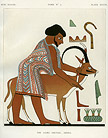Self-identity Relative to non-Egyptians
When Egyptians left Egypt, they took their Egyptian identity with them and, in some cases, consciously converted foreigners under their control to Egyptian ways. This is especially true of Egyptians in Nubia, to the south of the first cataract at Elephantine/Aswan. Similarly, in the New Kingdom, the sons of local leaders in Syria-Palestine were brought to Egypt to be trained in Egyptian ways and to learn loyalty to Egypt.
Through time, more and more foreigners came to Egypt. Initially people were brought as prisoners of war. Population movements drove communities into Egypt. Many foreigners adopted the Egyptian language, Egyptian deities, Egyptian clothing and Egyptian customs and seem to have been treated by Egyptians as Egyptian. However, several immigrant groups seem to have become identified with specific occupations and what had been an ethnic term became an occupational title (e.g., the word for “shepherds” comes from the word for “Asiatics,” the word for “policemen” comes from the name for one Nubian tribe).
By the Late Period, people were coming as mercenaries, as merchants, and so on. Eventually Egypt was incorporated into major empires, some centered in Egypt (e.g., the Ptolemaic empire in the Hellenistic period), some centered outside Egypt (e.g., the Achaemenid/Persian empire centered in modern Iran, the Roman empire). Fairly large communities of non-Egyptians lived in Egypt. Some adopted Egyptian deities or other aspects of Egyptian culture; some learned the Egyptian language. But many of these communities were large enough, or had enough political power, that they maintained much of their original culture and passed it along for generations. Although the Ptolemies made use of ethnicity or ethnic origin as part of state-imposed identification of individuals, it was not until the Romans incorporated Egypt into the Roman empire that ethnic identification was used as the basis for granting or denying special privileges to entire groups.

 Janet H. Johnson
Janet H. Johnson
Morton D. Hull Distinguished Service Professor of Egyptology
Guiding Questions
1. How did ancient Egyptians maintain a sense of self-identity in their unitary society?
2. Why do you think elite Egyptians maintained distinct gender roles while for the more common people this line was blurred?
3. Discuss how, over time, foreigners blended in with Egyptian society. Identify modern unitary societies that have assimilated foreigners and compare their assimilation strategies.


 Print Page
Print Page

